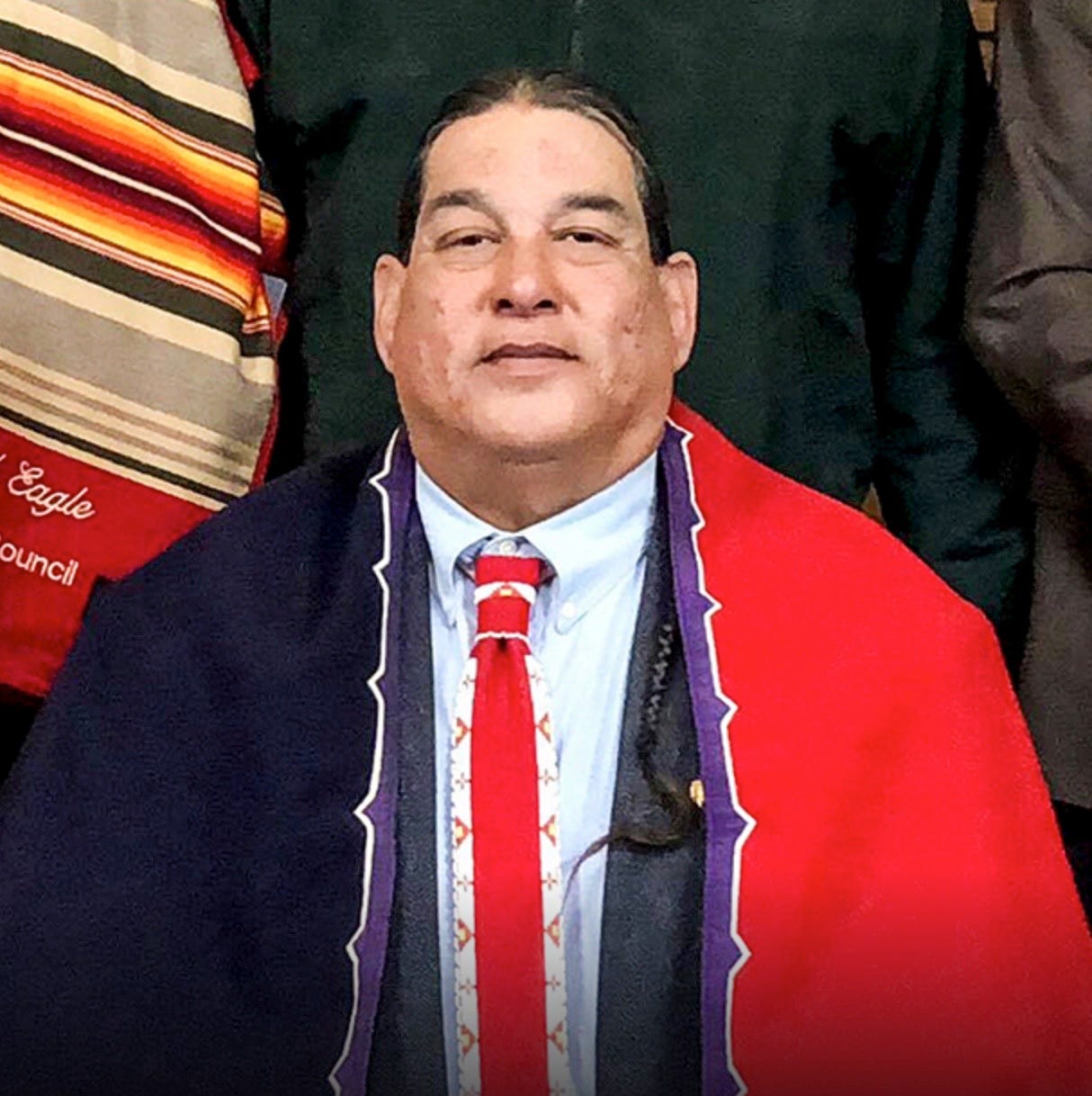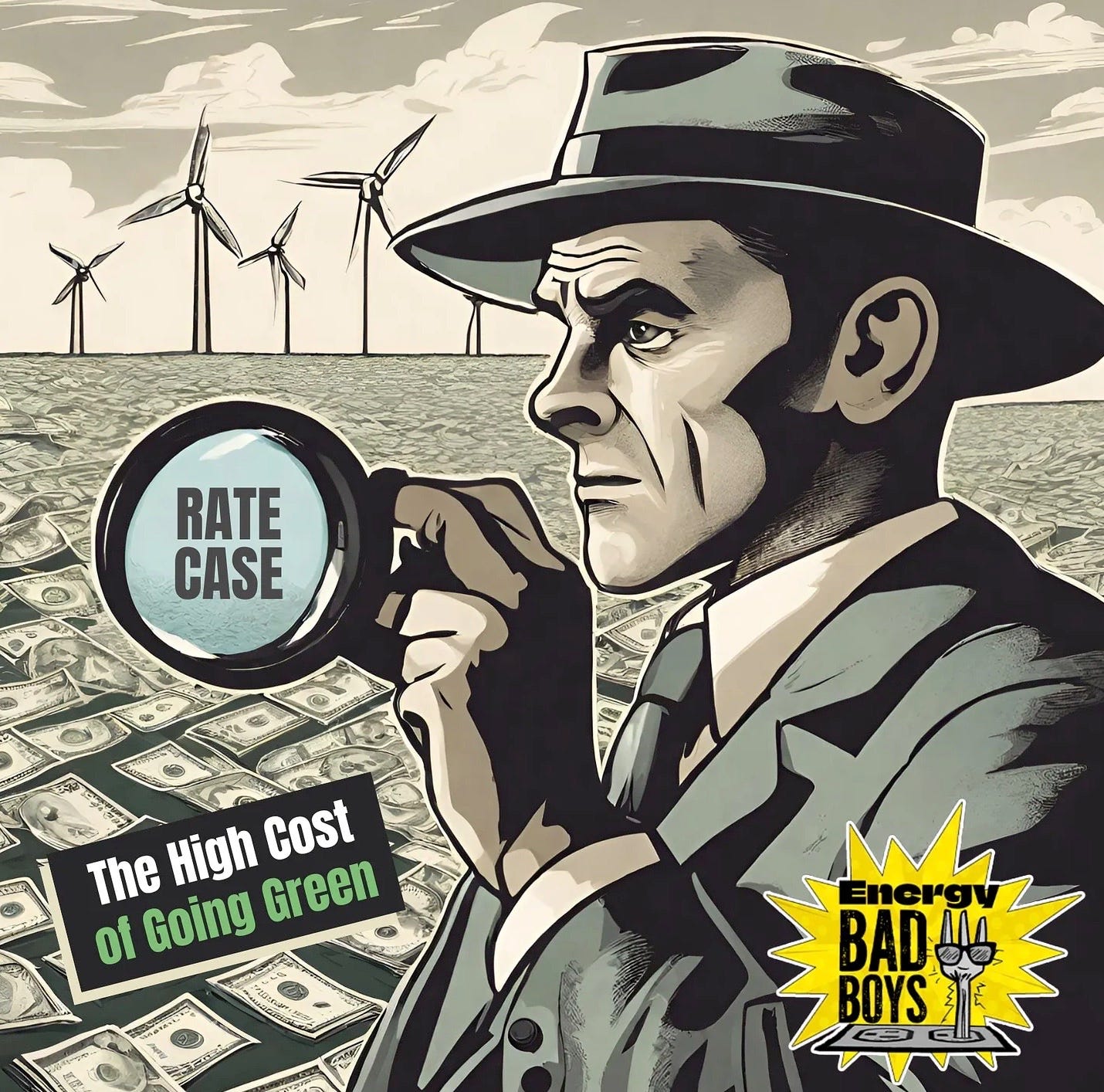Osage Minerals Council Chairman Everett Waller: “We Fought The Battle On Behalf Of Our Children’s Future”
Plus: NYT sets new record for “energy transition” articles, two recommendations, and an obit

Last Tuesday, I published a Power Hungry Podcast with Everett Waller, the chairman of the Osage Minerals Council. I have been in contact with Waller for nearly four years, but he has refused to do an interview because the tribe was in litigation against Enel. But on December 20, a federal judge in Tulsa sided with the tribe and declared that the Italian company must remove all 84 turbines it built using the tribe’s rocks without getting a permit. As I explained here on December 23, this is a landmark ruling. It is a huge win for the tribe and a massive loss for Enel and the climate change carpetbaggers at Big Wind.
Two weeks ago on X/Twitter, I predicted that legacy media outlets, including the New York Times, NPR, and Washington Post, would ignore the ruling because it doesn’t fit the “green” narrative. Thus far, I’ve been proven right. Despite the media blackout, Enel must dismantle the turbines. That will cost about $300 million, which is more than the company spent building the project a decade ago. The tribe will now seek compensatory damages from Enel for violating its sovereignty and stealing its property. How much will it seek? Waller refused to provide a number but said it “rhymes with millions.”
Given the importance of the ruling, I am publishing excerpts from the podcast, which we recorded on December 29. To my knowledge, it is the most extensive interview that Waller, or any Osage tribe official, has given since the December 20 ruling. The excerpts have been ordered and condensed for clarity.
Robert Bryce: Introduce yourself, please.
Everett Waller: I represent a mighty tribe out of Oklahoma. We have a situation of having bought a reservation during the Civil War, and we plan on keeping it. The homeland is what's valuable to us and our traditions. And at this case, I'm in the situation here to take on all comers who do want to follow the guidelines and procedures here on my reservation. And I call it mine, that's for all the ages. I have been in many court battles and won them all. I went to the Supreme Court and showed that you can beat anyone on any given day long as you never give up.
RB: After a 12-year legal battle, how does this feel?
EW: It feels proper. We knew that when you come into an Indian reservation that was bought after the Civil War, we're never recognized in that capacity. But that's where our grounding comes from I think that the actual case, I appealed it with the support of my counsel for the last nine years, and the United States was not going to appeal it. So we went ahead and went to fight the battle on behalf of our children's future. I think it's going to be a landmark case, spoken about long after I'm dead. And then I want to just reiterate, I couldn't thank my councils enough for their support. [I] could not thank the Osage people for the support they showed us and the commitment that my people had.
RB: What did you think about the new movie, Killers Of The Flower Moon?
EW: I'm a former commissioner for my tribe and I grew up here in the Hominy village. I watched my first man get shot in front of us at 10. Those items were hard to watch, but also it's hard to live with later. These aren't just someone that I watched a movie about. These are my family. And with that being said, I think the movie is excellent in bringing up the issues. It falls short in some areas, but it doesn't on the tragedy that we faced. I think there's a clarity there This is what happened. This is what greed will do. Then also, we're looking at doing another element of some other issues that happened to the Osages during this time. I've only watched it once, and I cried after I saw it. Now, I'll be happy to admit to that, it hurt. This isn't a movie I'm watching. These are some of my family members. Henry Rohn's people, all my family on the one side, the Murrell side, the Copperfield side, these people all had loved ones lost there. And I think that's gonna be the next issue is that how many families were affected, 300, 400 by just the first single murder or loss of their loved ones. And how that articulated to today's time as it moved us up, as it moved us, down. I think that the nation has done very well in allowing this.
RB: What are you reading?
EW: I go back to my Bible. I have moments with my wife because through this battle, every warrior gets damaged. And what I do is I go with the loved ones of my family and have moments with them in prayer. And I had two eagles show up yesterday here at the house, which is a great sign that the Lord's in command. And that's what I usually go with. Other than that, hundreds and hundreds of pages [of legal documents] every evening.
RB: Tell me about the eagles.
EW: It was a wonderful moment. We had them fly up here in the yard. And I was so surprised that you can see them fly over, but to be sitting here, and then they started screeching because they're a pair and they mate for life. And I felt like that's my Osage, just like those eagles, which we hold at the highest esteem, that that's the only bird that can fly up to the right hand side of God, get his blessings and fly back down to us.
RB: And these were bald eagles?
EW: Yes.
RB: It's interesting they would be in the Hominy area because I usually associate them with being around the Arkansas River and not necessarily so close to the Tallgrass.
EW: I just don't know what to tell you other than I look for blessings from the Creator and I definitely got one.
RB: Everett Waller, it's been a real pleasure. Glad that we could finally make time and congratulations. And I mean that sincerely. It's a huge win for the tribe...I'm a longtime critic of the wind business, proudly so, and to see you beat them in court, I've got to tell you, I'm enjoying it right next to you. Congratulations.
EW: I'm ecstatic brother.
The Energy Transition Is Underway, But Only In The Pages of The New York Times
On July 1, in “The Energy Transition Isn’t,” I explained that despite the $4.1 trillion spent globally on wind and solar since 2004, those two forms of energy are not even keeping pace with the growth of hydrocarbons, much less displacing them. In fact, over that time, hydrocarbon use increased 3.4 times faster than wind and solar. Of course, that’s not what we hear from big media outlets, big NGOs, and the White House. Here’s what I wrote in July:
So, if growth in hydrocarbons is outstripping the growth in wind and solar, why are we being flooded with claims about the energy transition? The short answer: it’s part of a media campaign that has surged under the Biden Administration. Evidence of the marketing effort can be seen in the number of times the phrase in question has appeared in the New York Times over the past few years.
Now that 2023 is over, I updated the numbers. As seen in the graphic above, from 2015 to 2020, “energy transition” occurred only a few times per year in the pages of the Times. But in 2021, the year Biden took office, the mentions doubled and then tripled to 146 mentions in 2022. It increased to 162 in 2023. Put another way, between 2020, when Donald Trump was president, and 2023, the use of “energy transition” in one of America’s most famous newspapers increased nearly eight-fold. Alas, it’s far easier to write about quitting hydrocarbons than it is to do so.
Recommended Reading: Orr and Rolling on Why Renewables Mean Higher Prices and Darwall on Britain’s Disastrous Net Zero Misadventure
On Saturday, two of my favorite energy writers, Isaac Orr and Mitch Rolling, took a deep dive into the soaring cost of electricity. What did they find? “rising electricity prices are largely being driven by spending billions of dollars on wind turbines, solar panels, natural gas plants, and new transmission lines in pursuit of the so-called ‘energy transition.’” Looking at rate cases filed by some of the country’s biggest electric utilities, they found that “every single one of the eight companies listed wind and solar investments or the energy transition as one of the primary reasons for raising electricity prices, and multiple companies explicitly cited state mandates for clean energy or GHG reductions to justify the rate increases.” It’s a dynamite bit of reporting. Be sure to subscribe to their Substack.
My other recommendation is a deep dive into Britain’s disastrous climate policies by Rupert Darwall, titled “The Folly of Climate Leadership.” Like Germany, Britain has driven itself into the economic ditch by chasing weather-dependent sources like wind and solar. Darwall shows “how increasingly stringent climate policies have been justified on the basis of false claims of low and falling renewable energy costs, especially of offshore wind, so that net zero was adopted in ignorance of its likely costs.” Darwall’s 75-page report is an example of top-notch reporting. It is fully referenced and jammed with facts and charts. He concludes that Britain’s net zero jihad “constitutes an antigrowth economic strategy that near-zero- growth Britain can ill afford.” He also provides a stark warning: “America has the example of Britain’s disastrous energy policies and looking before it leaps.” Again, I highly recommend it.
R.I.P., P.G.R.
On December 14, my father-in-law, Paul G. Rasmussen, died after a long illness. I am noting his death here because he wasn’t just Lorin’s father. He was my mentor, too. He read my book manuscripts before publication and patiently pointed out technical and grammatical errors. He also underscored places where he disagreed with me. (And we did disagree.) Paul taught chemistry at the University of Michigan for 42 years and was an expert in batteries and anything related to elements, the periodic table, and molecular structures. He was among the hardest-working people I’ve ever known. I will miss him.
Click that ♡ button, please. And of course, subscribe and share.






Your informed, impartial, and fact-based writings are an essential counter to the swill offered by much of the mainstream media. Keep up the good work!
Good work by the Osage. They've learned how to play the game and win.
Lack of coverage isn't necessarily political... the coastal media never carry Oklahoma news whether it's good or bad by their standards. Oklahoma is an Unstate.